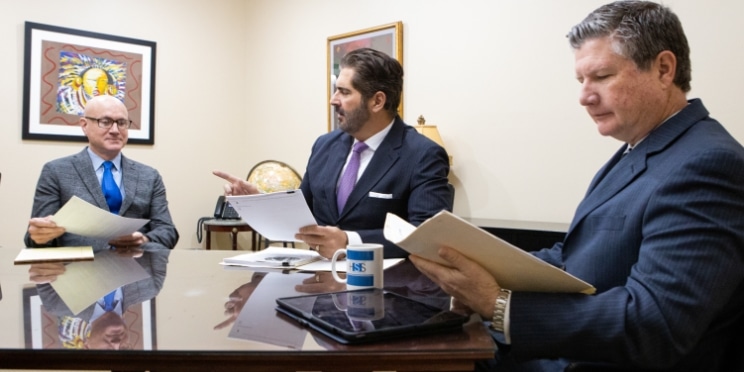Who Is Responsible For My Medical Bills After A Crash
Injuries from a collision can be life-altering and catastrophic. Victims of a car crash often spend many months going to specialists like orthopedists, neurologists, surgeons, and physical therapists to put their lives back together. Even minor car collisions can require a trip to the emergency room and appointments with your primary care doctor. Medical expenses soar quickly and often place families in serious financial trouble. If you’ve been injured in a collision, be sure you understand who is responsible for paying your medical bills. Let the skilled injury attorneys at Holder Susan Slusher help.
Who Pays My Medical Bills
Regardless of the reason for your medical bills, medical facilities and doctors provide their services to you, and not to anyone else, therefore these bills are your legal responsibility. This makes it vital that you obtain full compensation on your claim, so that all of your medical bills are paid, all valid liens are satisfied, and you still receive a full recovery for your pain and suffering.
Remember, even if the collision wasn’t your fault, you almost always have to pay medical expenses out of your own pocket until you can collect the compensation you deserve. The negligent driver’s auto insurance company will NOT pay your medical bills as they are incurred for several reasons:
- Liability Insurance carriers do not always agree with the nature and extent of your medical treatment.
- Liability insurance carriers want to receive the benefit of your health insurance negotiated rates for you medical treatment, or the lower Medicare and Medicaid rates.
- Liability insurance carriers may not agree that their insured was at fault for the collision, or that you share in the fault for the collision.
- Liability insurance carriers don’t want to pay anything for your claim and will use any excuses not to do so.
Minimizing the Financial Burden
There are several ways to minimize the financial burden while obtaining the medical treatment necessary to recover from your injuries.
Some options that may assist with medical bills are:
- Private health insurance or group health plans.
- Medicaid and/or Medicare plans, including supplemental plans you purchased.
- Medical payments coverage through your personal auto insurance policy.
- Medical payments coverage through the driver’s personal auto policy (if you were a passenger in a vehicle).
- Medical payments coverage of the vehicle owner’s policy (if you were operating a non-owned vehicle).
Group Health, Medicaid, and Medicare Coverage
Group health plans, such as BlueCross BlueShield, Aetna, Humana, along with Medicaid and/or Medicare plans, pay medical providers on a negotiated fee agreement. This simply means that the insurance carrier has previously reached an agreement with the medical provider to take a discounted payment for services. Once your deductible and/or co-payments have been met, the remaining balance after the negotiated fee payment will be contractually adjusted, or simply written off by the medical provider. In the simplest terms, you should not be responsible for the difference between the negotiated fee rate and the originally charged amount once your deductible and co-payments have been met.
You may ask “how does this benefit me?” Some insurance carriers, along with Medicaid and Medicare, are entitled to subrogation/right to recover the money they paid on your behalf when you receive a third-party settlement. This seems that you may be losing additional money by paying back your group health plan; but remember the group health plan satisfied your medical bills at a negotiated rate, therefore saving you from having to pay the full amount originally billed.
If you receive benefits from Medicaid, Medicare, or even a supplemental Medicare plan you are legally obligated to reimburse them from your settlement.
It is best to contact an experienced injury attorney prior to accepting any settlement offer to make sure you are being fully compensated for your losses, that all available insurance has been exhausted, and any insurance and medical liens are appropriately satisfied.
Often attorneys are able to negotiate outstanding medical bills and health insurance subrogation liens in order to more fully compensate your recovery.
Failure to Pay Medical Bills
Until a settlement has been agreed upon or a jury verdict has been reached, the medical bills are your responsibility. Failure to pay your medical bills can result in the accounts being turned over to a collection agency and your credit score being harmed.
If you do not have health insurance available, it may be beneficial to contact the medical providers and let them know your treatment was related to a collision to see if they are willing to put a hold on your account until a settlement is reached. Often, if the provider is unable to hold the account until settlement, they will work with you on a payment plan to prevent your account from being turned to a collection agency.
Hire an Experienced Personal Injury Attorney
Navigating medical bills, health insurance representatives and insurance adjusters, and obtaining a fair settlement can seem like a complex maze. Without an attorney on your side, you may not recover the full compensation you are entitled to. Insurance companies work tirelessly to prevent you from obtaining the fair compensation you deserve.
HSS Law Firm offers free consultations to help you understand your rights. Your recovery is our top priority. If there’s no recovery, there is no fee.
If you’ve been injured in a car crash, contact the skilled Missouri injury attorneys at Holder Susan Slusher LLC to see if we can help, (573) 499-1700. Columbia MO attorneys.


